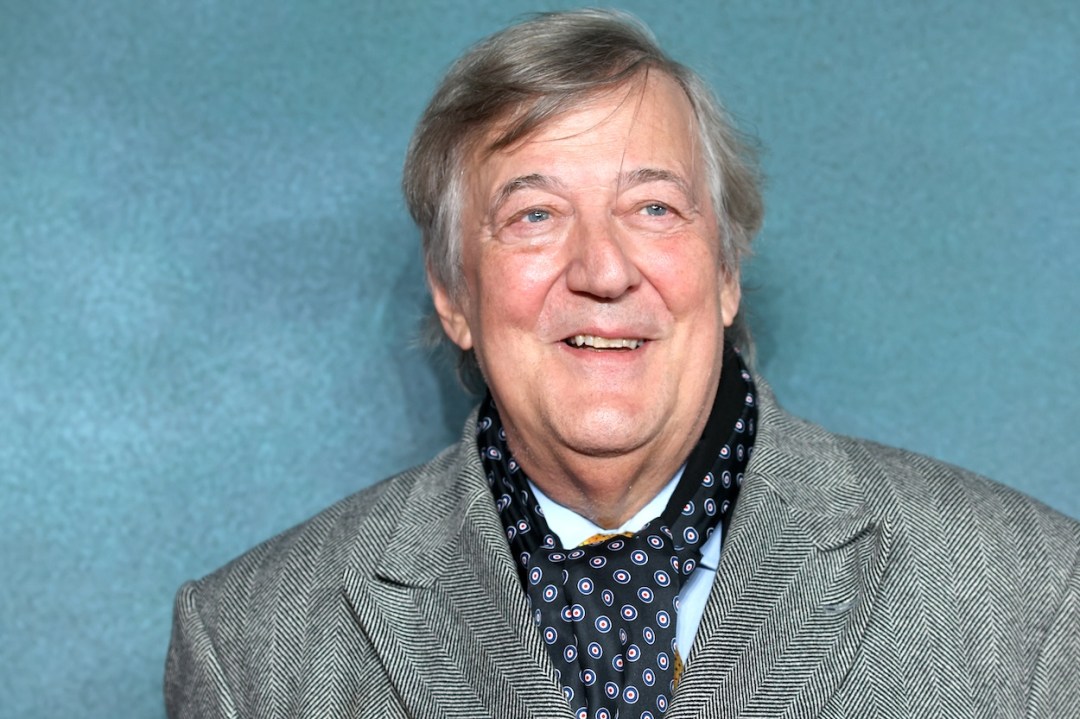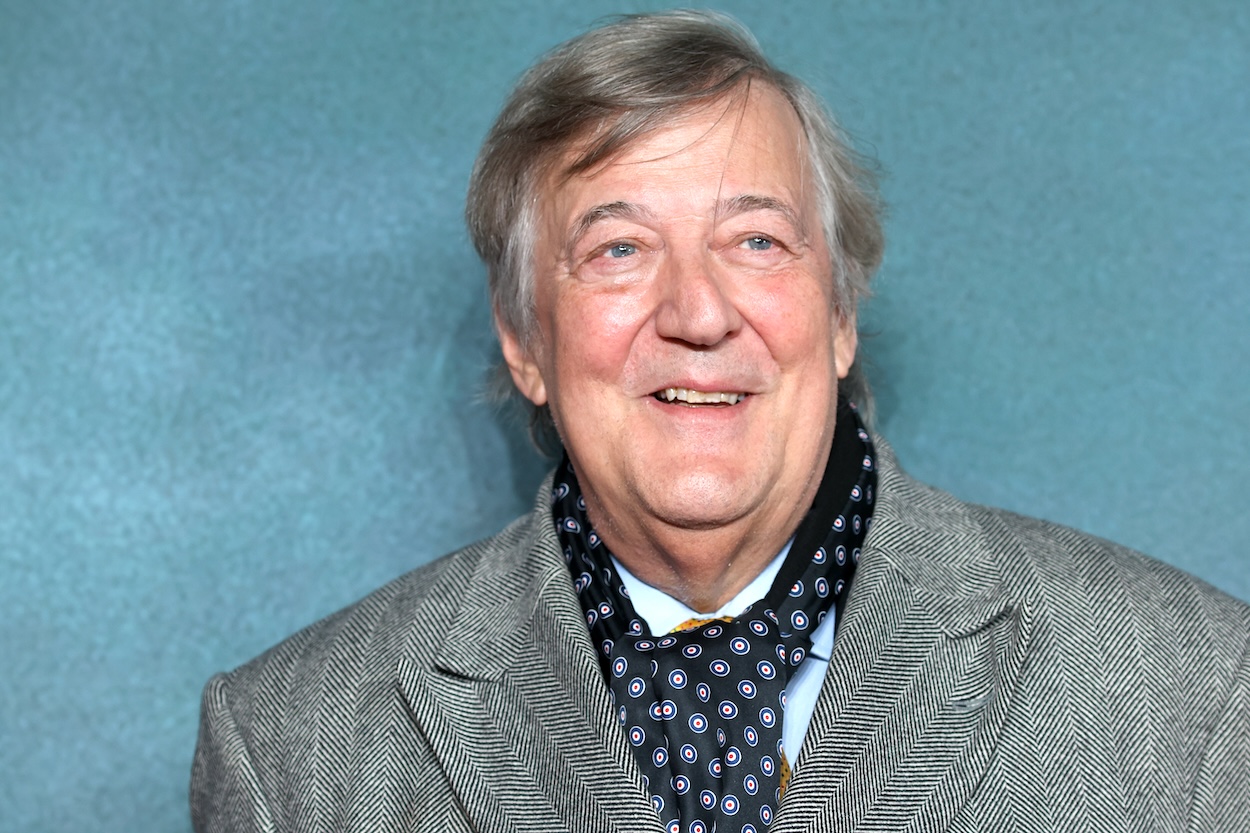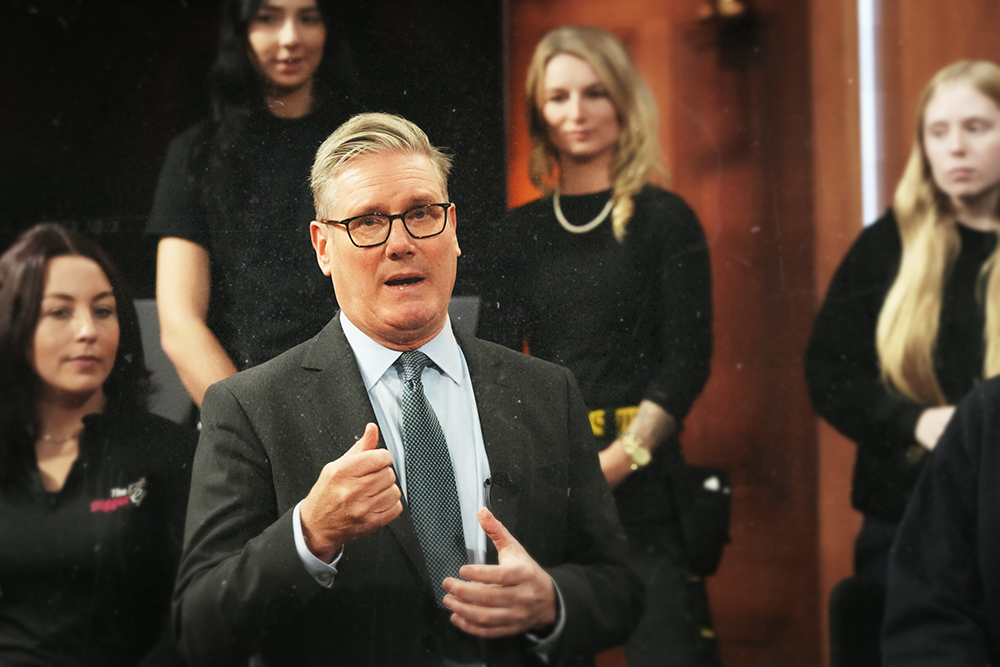‘I was born to play Lady Bracknell,’ Stephen Fry swanked recently, in an interview to mark a new production of The Importance of Being Earnest, running until January. I can’t be the only one to greet the idea of another round of Fry interviews with a desire to go to bed and not come out till it’s all over. But that would be a long hibernation. For Stephen Fry pronouncements are like professional tennis; it’s always open season.
You can’t get away from the clown, particularly when he’s lecturing women on how they should feel about having great hairy men in mascara sharing their private spaces. Magnificently, J.K. Rowling denied they had ever been friends after Fry came out with a more-in-sorrow-than-in-anger lecture about how his previously amiable alleged-mate had been ‘radicalised’ by evil Terfs and had become a ‘lost cause’. Then there was the time we had to listen to him threatening to leave a private members’ club that didn’t admit women – after having been a member for decades under these conditions ‘Oopsie!’ as Fry himself might exclaim, if in Adorably Awks Mode.
But casting him in Oscar Wilde’s most famous play will produce a flood of twee nonsense unparalleled in modern media. It’s already started with four months to go, so imagine the sheer volume by the time we get to Christmas. Which is fitting, in a way, as the season of the pantomime dame will soon be upon us. It isn’t just me who has beef going way back – I called him ‘a stupid person’s idea of a clever person’ about 20 years ago – but also Alexander Larman, who suggested here that ‘this is pandering to West End audiences who demand Big Stars at all costs.’
Fry will ostensibly shrug off any criticisms because of what he thinks of as his unique Wildean bond. He said of his most recent project:
Oscar Wilde has been a hugely important figure in my life and career and The Importance of Being Earnest is a play that changed my life when I first saw it aged ten. It made me understand what language can do and absolutely transported me. Wilde is a beacon to people who still believe in open thinking and adventuring with the mind and spirit.
Fry has also played Wilde in a 1997 film; to be fair, it’s nigh impossible to find a bad review of it (and boy, did I ever look). But I have an inkling that there’s one person who wouldn’t have enjoyed Fry as Wilde – and that’s Wilde himself.
What Fry does have is the confidence – false confidence, in my opinion – of being fawned upon ad infinitum by witless members of the media. They have done him no favours in building up his frail ego. Recall Fry’s former, unhappy associations with the theatre. Famously, he fled to Brussels in 1995 after critics savaged his performance in Simon Gray’s Cell Mates. His own website admits that the episode haunts him, though he claims depression has faded to embarrassment and anger to forgiveness. Gray was blunter at the time: he admitted it was a mistake to cast Fry at all, and said that by the time Fry’s inadequacies were obvious, he ought to have removed him. Fry’s sudden disappearance, Gray said, caused chaos for the rest of the company.
It’s hard to imagine Oscar, so glintingly secure in his own brilliance, pulling a stunt like this. Wilde’s dislike of Fry would certainly not have been driven by envy for a rival cerebral sharp-shooter, one whose aperçus would have the great Irishman hopping from foot to foot.
Then there’s the national treasure element. Fry revels in this most milquetoast of honours, and will grow more insufferably into it as he ripens into pungent old age. He loves to hob-nob at the Palace; Wilde died in exile, after humiliation and imprisonment, at the age of 46. There’s the cutesy thing; Wilde was never cutesy – even his children’s stories are harsh. There’s the associated self-deprecating clowning, something Fry has in common with his equally insufferable pal Emma Thompson (whoopsadaisy, took a US-UK-US flight to protest against climate change – silly me!).
The contempt they hold for those who weren’t in the Footlights (and went on to vote Brexit, the chav bastards) comes through in certain comments. Take Thompson’s self-exposing description of this country, which made her rich and famous, as a ‘tiny little cloud-bolted, rainy corner of sort-of Europe, a cake-filled misery-laden grey old island.’ Or Fry’s pronouncements on women’s sexuality, bless the silly sausages, a topic which I would venture he has next to no experience of.
It’s hard to imagine Oscar, so glintingly secure in his own brilliance, pulling a stunt like this
What about the commercial aspect of Fry and Wilde’s careers? I think Wilde would find it hard to understand why someone as rich as Fry (his fortune is estimated at around £30 million) needs to do as much voice work as he does, including video games. Wilde, of course, died in penury, having for many years been effectively barred from making a living as a writer.
Most crucially, I believe that Wilde had an open mind, and that Fry has a closed one – probably one of the best indicators of how intelligent a person is. This is a subject which is written about by Justin Brierley in a fascinating essay on religion called What Stephen Fry Could Learn From Oscar Wilde. The essay is a response to Fry’s criticism of a religion, calling a God he doesn’t believe in a ‘stupid, evil, maniac’. Brierley instead uses Wilde’s story of ‘The Selfish Giant’ to explain the heart of Christianity. No one who had seriously engaged with Wilde’s faith would use a word like ‘stupid’.
Inferior talents, naturally, need even shoddier stooges to make them look better, so I couldn’t help laughing when I read that cast opposite Fry is Olly Alexander, famous only for pulling in ‘nul points’ from the Eurovision audience. If ever there was a dull, fourth-rate modern showbiz ‘personality’ guaranteed to make the star look good, Alexander is it. In a recent Sunday Times interview, the journalist noted innocently that Alexander ‘seems happy for his co-star to do most of the talking.’ Where Wilde craved ‘feasting with panthers’, Fry prefers the safer option of having little-nibbly-bits with pussycats – nom nom!
Maybe I was spoiled by seeing Maggie Smith play Lady Bracknell as a youngster. But surely all can see there’s something off about Fry wearing comedy breasts; it’s a wonder that it took the crass old fraud so long. I can’t help thinking – nay, hoping – that Fry has gone too far this time, and that in his over-reach will reveal himself as the grasping, shallow sell-out that he is. That is, the type of person that Oscar Wilde thoroughly loathed. It may well be true that ‘to love oneself is the beginning of a lifelong romance’ – but surely the love story between Stephen Fry and himself has delighted us long enough.








Comments